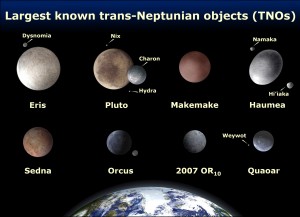Physicist: Short answer: Life is the only thing that makes lots of oxygen.
This question comes in the context of a conversation about the Kepler mission. So far (as of January 11, 2010) 424 “exoplanets” have been discovered and confirmed in orbit around other stars (update, Nov 10, 2010: 495 planets). It’s worth pausing to take a minute and say, “holy shit!”. Most civilizations throughout the ages have been aware of Mercury, Venus, Mars, Jupiter, and Saturn, and so was it for tens of thousands of years. Between 1781 and 1930 we found 4 more: Uranus, Ceres, Neptune, and Pluto. (It’s been slow.)
Since 1992 we’ve found over 400 new planets around other stars and, depending on where you draw the line, between 7 and several dozen new dwarf planets around our star. It may have nothing to do with the question, but I think it’s worth knowing.
Unpause. Due to the difficulties in measurement, the vast majority of the exoplanets discovered so far are bigger than Jupiter, and orbit their parent star closer than Earth orbits the Sun. Kepler holds the promise of detecting Earth sized planets, and brings us a step closer to detecting life around other planets (even if there were life on gas giants, it would be so alien we wouldn’t know what to look for). Kepler works by waiting for eclipses. When a planet passes in front of its star, the star appears to dim a little (if someone around another star were to see Earth do this, the Sun would appear to dim by about one part in 10,000). Even better, by staring really (really) hard you can actually see light that has passed through the atmosphere of those planets, and now you’re talking chemical analysis!
If you look around at the other planets in our solar system you’ll notice that they all have something in common: their atmospheres are all chemically stable. The other atmospheres, CO2, Hydrogen, Helium, Methane, etc., don’t do much more than just blow around. You can’t start a fire anywhere other than Earth.

Oxygen: The jerk of the elements. It's corrosive, burns like crazy, and is generally reactive and unstable.
Oxygen, on the other hand, is about as stable as a drunk unicyclist. When you find oxygen in nature (and by “nature” I mean “other than Earth”) it’s always already tied up in the molecules of something else (such as in water or granite). As soon as oxygen is released it tends to immediately combine with things around it. It has been estimated that, left on it’s own, atmospheric oxygen will be completely absorbed by chemical processes within a few hundred years, and that’s not including big fires and whatnot.
The only known process that actually releases O2 into the air in any real quantity is photosynthesis. So, observing oxygen in the atmosphere of other planets implies photosynthetic life.








Not really true. The athmosphere of the moon Europa of Jupiter has also oxygen. The UV-rays and ions of outer space smashed the watermolecules on the surface apart. Hydrogen escaped and oxygen stayed.
http://solarsystem.nasa.gov/planets/profile.cfm?Object=Jup_Europa
That’s cool!
(article on it)
It’s not that it’s impossible to find any oxygen of any kind in an atmosphere. For entropy/partial-pressure reasons you’d usually expect to find at least a tiny bit. And that’s exactly what we’ve got on Europa: an atmosphere that’s a hundred billion times thinner than Earth’s, with trace amounts of oxygen. There’s oxygen, sure, but you couldn’t light a match out there.
I should have been more explicit in the post, but the idea is that an atmosphere with oxygen as a primary component is essentially impossible by any known, non-biological process, because it’s unstable.
What if some planet has so much oxygen in the first place that even if all other elements (silicon, iron, aluminum, hydrogen, carbon and so on) are converted to their oxides and that the highest possible oxidation states are reached, there is still a significant amount of oxygen left? Then the planet would HAVE TO have an oxygen atmosphere. And it’s gonna be very dense, probably.